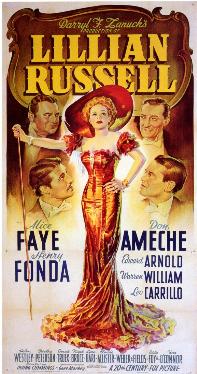| Lillian Russell | |
|---|---|
 Theatrical release poster | |
| Directed by | Irving Cummings |
| Written by | William Anthony McGuire |
| Produced by | Darryl F. Zanuck |
| Starring | Alice Faye Don Ameche Henry Fonda Edward Arnold |
| Cinematography | Leon Shamroy |
| Edited by | Walter Thompson |
| Music by | David Buttolph (uncredited) Cyril J. Mockridge (uncredited) Alfred Newman (uncredited) |
Production company | 20th Century Fox |
| Distributed by | 20th Century Fox |
Release date |
|
Running time | 127 minutes |
| Country | United States |
| Language | English |
Lillian Russell is a 1940 American biographical film of the life of the singer and actress. The screenplay was by William Anthony McGuire. The film was directed by Irving Cummings and produced by Darryl F. Zanuck. It stars Alice Faye in the title role, Don Ameche, Henry Fonda and Edward Arnold as Diamond Jim Brady.
Contents
Richard Day and Joseph C. Wright were nominated for an Academy Award for Best Art Direction, Black-and-White. [1]